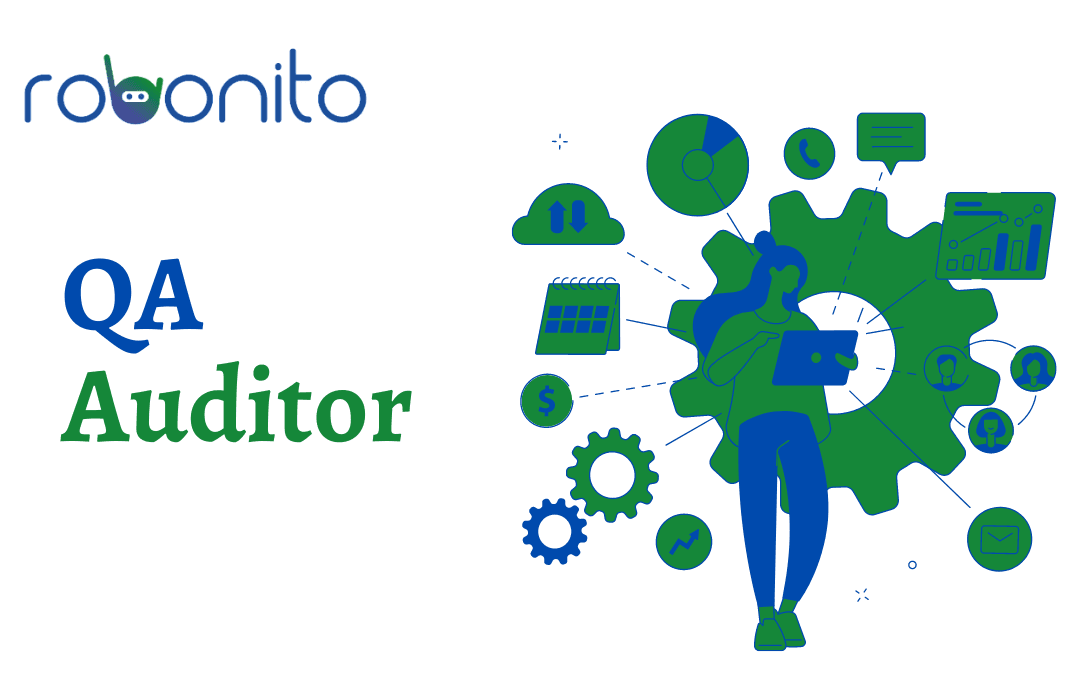In this article, we will explore the role of a QA auditor, their responsibilities, and how they contribute to streamlining QA processes for businesses. In today's highly competitive business landscape, ensuring the quality of products and services is paramount for success. Quality assurance (QA) plays a crucial role in maintaining high standards and customer satisfaction. However, managing and optimizing QA processes can be challenging without the right tools and strategies in place. This is where a QA auditor comes in.
What is a QA Auditor?
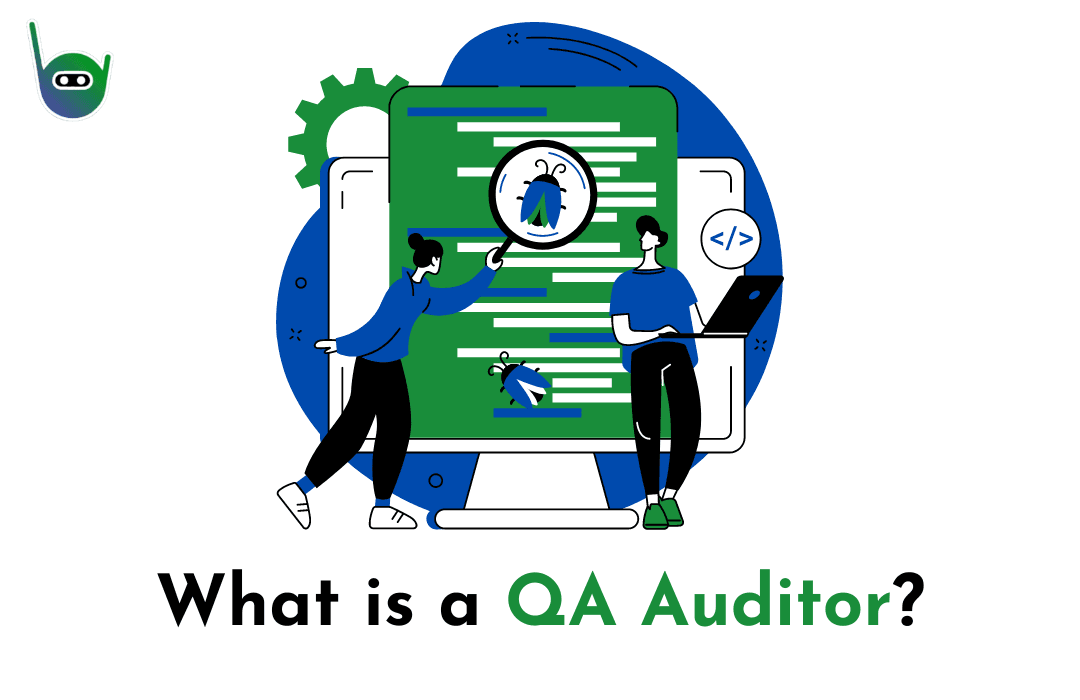 A Quality Assurance is a skilled professional responsible for evaluating and ensuring compliance with quality standards within an organization. They perform systematic assessments and audits to identify areas for improvement and drive overall quality enhancement. QA auditors possess a deep understanding of industry-specific regulations, quality management systems, and best practices.
A Quality Assurance is a skilled professional responsible for evaluating and ensuring compliance with quality standards within an organization. They perform systematic assessments and audits to identify areas for improvement and drive overall quality enhancement. QA auditors possess a deep understanding of industry-specific regulations, quality management systems, and best practices.
The Role of a QA Auditor
The main responsibility of a Quality Assurance (QA) auditor is to evaluate how well an organization's quality management processes are working. They do this by carefully reviewing and examining these processes through a method called auditing. During these audits, the QA auditor looks for any differences or inconsistencies, areas where the organization might not be following established standards or rules, and spots where improvements can be made to make things work better.
The QA auditor doesn't work alone but collaborates with different teams within the organization. They interact with quality assurance teams, production teams responsible for making products or delivering services, and management teams overseeing operations. By working together, they aim to find solutions to any problems identified during the audits. These solutions typically involve taking corrective actions to fix existing issues and putting preventive measures in place to stop similar issues from happening in the future. This collaborative effort ensures that the organization maintains high standards and continually improves its processes to deliver better products or services.
Quality Assurance Auditor Responsibilities:
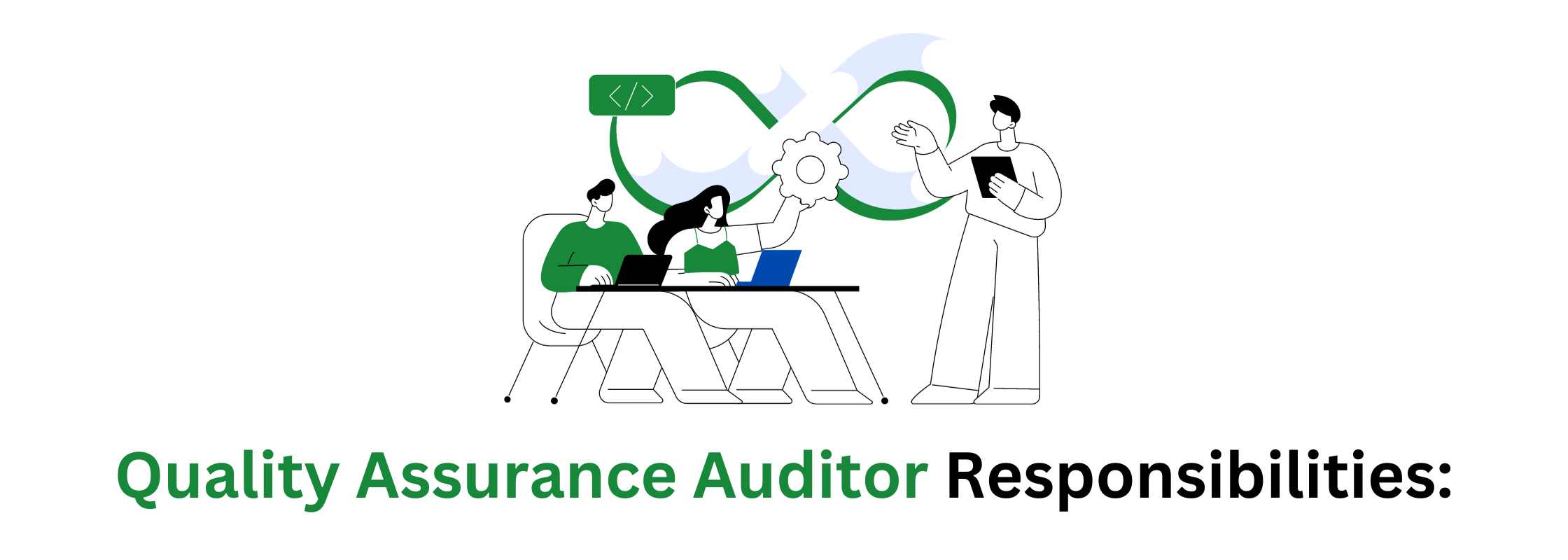
1. Conducting Quality Audits:
-
Plan, organize, and execute audits
-
Review processes, procedures, documentation, and practices
-
Identify areas for improvement and ensure compliance with quality standards
2. Assessing Compliance:
-
Evaluate organizational compliance with regulations, standards, and customer requirements
-
Verify processes and products meet necessary criteria and specifications
-
Identify non-compliance issues and recommend corrective actions
3. Documenting Audit Findings:
-
Maintain accurate records of audit observations and discrepancies
-
Prepare detailed reports to communicate audit results
4. Providing Recommendations:
-
Suggest process improvements and preventive measures
-
Collaborate with departments to develop action plans
5. Monitoring Corrective Actions:
-
Ensure implementation of recommended actions
-
Verify the effectiveness of implemented solutions
6. Conducting Supplier Audits:
-
Evaluate and audit suppliers and subcontractors
-
Assess the quality of incoming materials, products, or services
7. Facilitating Continuous Improvement:
-
Foster a culture of continuous improvement
-
Participate in quality improvement initiatives and promote best practices
8. Staying Updated with Industry Trends:
-
Stay abreast of industry trends and regulatory changes
-
Update knowledge and skills accordingly
9. Collaborating with Stakeholders:
-
Work closely with quality managers, production teams, and department heads
-
Ensure effective communication and alignment of objectives
10. Conducting Training and Awareness Programs:
-
Deliver training programs on quality management
-
Raise awareness of quality standards and processes
Requirements To Become Quality Assurance Auditor :
To excel as a Quality Auditor, individuals should possess a combination of skills, qualifications, and personal attributes. Here are the key requirements for this role:
1. Education and Qualifications:
-
Bachelor's degree in a relevant field such as Quality Management, Engineering, or a related discipline.
-
Professional certifications in quality auditing, such as Certified Quality Auditor (CQA), ISO 9001 Lead Auditor, or similar credentials, are highly advantageous.
2. Knowledge of Quality Management Systems:
-
In-depth understanding of quality management principles, methodologies, and best practices.
-
Familiarity with relevant industry standards and regulations, such as ISO 9001, ISO 13485, or sector-specific quality frameworks.
3. Auditing Expertise:
-
Proven experience in conducting quality audits, preferably in a related industry.
-
Knowledge of audit techniques, processes, and methodologies.
-
Ability to evaluate compliance, identify non-conformities, and recommend corrective actions.
4. Analytical and Problem-Solving Skills:
Strong analytical and critical thinking abilities to assess complex situations, identify root causes, and propose effective solutions.
Attention to detail and the ability to analyze data, reports, and documentation accurately.
5. Communication and Interpersonal Skills:
Excellent verbal and written communication skills to effectively interact with stakeholders at all levels.
Ability to convey audit findings, recommendations, and technical information clearly and concisely.
Strong interpersonal skills to build collaborative relationships and work effectively within cross-functional teams.
6. Attention to Quality and Compliance:
A keen eye for detail and a commitment to upholding quality standards.
Understanding of regulatory requirements and the ability to ensure compliance with applicable laws and regulations.
7. Ethical Conduct and Integrity:
Strong ethical standards and the ability to maintain objectivity, confidentiality, and professionalism during audits.
Adherence to ethical codes of conduct and a commitment to upholding the highest standards of integrity.
8. Continuous Learning and Adaptability:
Willingness to stay updated with industry trends, emerging technologies, and advancements in quality management practices.
Openness to learning and adapting to new audit methodologies, tools, and technologies.
9. Organizational and Time Management Skills:
Effective organizational skills to manage multiple audits, prioritize tasks, and meet deadlines.
Ability to work independently, manage workload efficiently, and maintain attention to detail in a fast-paced environment.
10. Strong Work Ethic:
Self-motivation, dedication, and a commitment to delivering high-quality audit results.
Willingness to go the extra mile, take ownership of responsibilities, and contribute to the success of the organization.
These requirements outline the skills, qualifications, and personal attributes necessary to thrive as a Quality Auditor. Meeting these criteria enables professionals to effectively assess quality management systems, drive compliance, and contribute to continuous improvement within organizations.
| Requirement | Description | Examples |
|---|---|---|
| Education and Qualifications | Acquire a Bachelor's degree in a relevant field such as Quality Management, Engineering, or a related discipline. Obtain professional certifications in quality auditing, like Certified Quality Auditor (CQA), ISO 9001 Lead Auditor, etc. | - Bachelor's in Quality Management from XYZ University <br> - Certified Quality Auditor (CQA) from ASQ <br> - ISO 9001 Lead Auditor Certification |
| Knowledge of Quality Management Systems | Deep understanding of quality management principles, methodologies, and best practices. Familiarity with industry standards like ISO 9001, ISO 13485, or specific quality frameworks. | - Experience implementing ISO 9001 standards <br> - Proficient in Six Sigma methodologies |
| Auditing Expertise | Proven experience in conducting quality audits, preferably in a related industry. Knowledge of audit techniques, processes, and methodologies. Ability to evaluate compliance, identify non-conformities, and recommend corrective actions. | - Conducted 30+ quality audits in the automotive industry <br> - Proficient in using audit software for data analysis |
| Analytical and Problem-Solving Skills | Strong analytical abilities to assess complex situations, identify root causes, and propose effective solutions. Attention to detail in analyzing data, reports, and documentation. | - Used statistical tools to identify production flaws <br> - Implemented solutions resulting in 20% efficiency improvement |
| Communication and Interpersonal Skills | Excellent verbal and written communication to interact with stakeholders at all levels. Ability to convey audit findings, recommendations, and technical information clearly and concisely. Strong interpersonal skills to work effectively within cross-functional teams. | - Presented audit findings to senior management <br> - Collaborated with engineering and production teams effectively |
| Attention to Quality and Compliance | Keen eye for detail and commitment to upholding quality standards. Understanding of regulatory requirements to ensure compliance with applicable laws and regulations. | - Implemented rigorous quality checks in manufacturing processes <br> - Ensured compliance with FDA regulations in pharmaceutical manufacturing |
| Ethical Conduct and Integrity | Strong ethical standards, objectivity, confidentiality, and professionalism during audits. Adherence to ethical codes of conduct and commitment to upholding the highest standards of integrity. | - Maintained confidentiality while handling sensitive audit information <br> - Upheld ethical standards even in challenging situations |
| Continuous Learning and Adaptability | Willingness to stay updated with industry trends, emerging technologies, and advancements in quality management practices. Openness to learning new audit methodologies, tools, and technologies. | - Attended seminars on the latest quality management trends <br> - Adapted to new audit software improving efficiency by 15% |
| Organizational and Time Management Skills | Effective organizational skills to manage multiple audits, prioritize tasks, and meet deadlines. Ability to work independently and maintain attention to detail in a fast-paced environment. | - Managed simultaneous audits across different departments <br> - Completed audit reports within specified timelines |
| Strong Work Ethic | Self-motivation, dedication, and commitment to delivering high-quality audit results. Willingness to take ownership of responsibilities and contribute to the success of the organization. | - Demonstrated commitment by working overtime to meet audit deadlines <br> - Took initiative in implementing process improvements |
Conducting Comprehensive Quality Audits
QA auditors conduct comprehensive quality audits to evaluate various aspects of an organization's operations. This includes reviewing documentation, procedures, workflows, and product/service quality. By meticulously examining each process, a QA auditor identifies potential risks, deviations, and areas for improvement. They document their findings and provide recommendations to enhance quality and regulatory compliance.
Implementing Effective QA Strategies
A QA auditor plays a pivotal role in developing and implementing effective QA strategies. They analyze existing quality management systems and identify gaps or inefficiencies. Based on their assessments, they propose and implement strategic improvements that align with industry standards and best practices. These strategies may involve process optimization, risk mitigation, and the integration of advanced technologies.
Utilizing Automation Tools in QA Auditing
In today's digital era, QA auditors leverage automation tools to streamline their auditing processes. These tools assist in data analysis, documentation, and tracking quality metrics. By automating repetitive tasks, QA auditors can focus on more critical aspects of their work, such as data interpretation and decision-making. Automation enhances efficiency, reduces human errors, and accelerates the identification of quality-related issues.
Collaboration and Communication in QA Processes
QA auditors collaborate closely with various stakeholders to ensure effective QA processes. They communicate with management, quality assurance teams, and other departments to share audit results, discuss improvement opportunities, and foster a culture of quality within the organization. Collaboration and open communication enable timely problem resolution, alignment of objectives, and continuous improvement in quality standards.
Benefits of Hiring a QA Auditor
Hiring a QA auditor brings numerous benefits to an organization. Firstly, they provide an independent and unbiased evaluation of quality management processes. Their expertise helps identify potential risks and improve overall product/service quality. Secondly, a QA auditor ensures compliance with industry regulations and standards, reducing the risk of legal and reputational issues. Lastly, by optimizing QA processes, businesses can enhance customer satisfaction, and loyalty, and gain a competitive edge.
Challenges Faced by QA Auditors
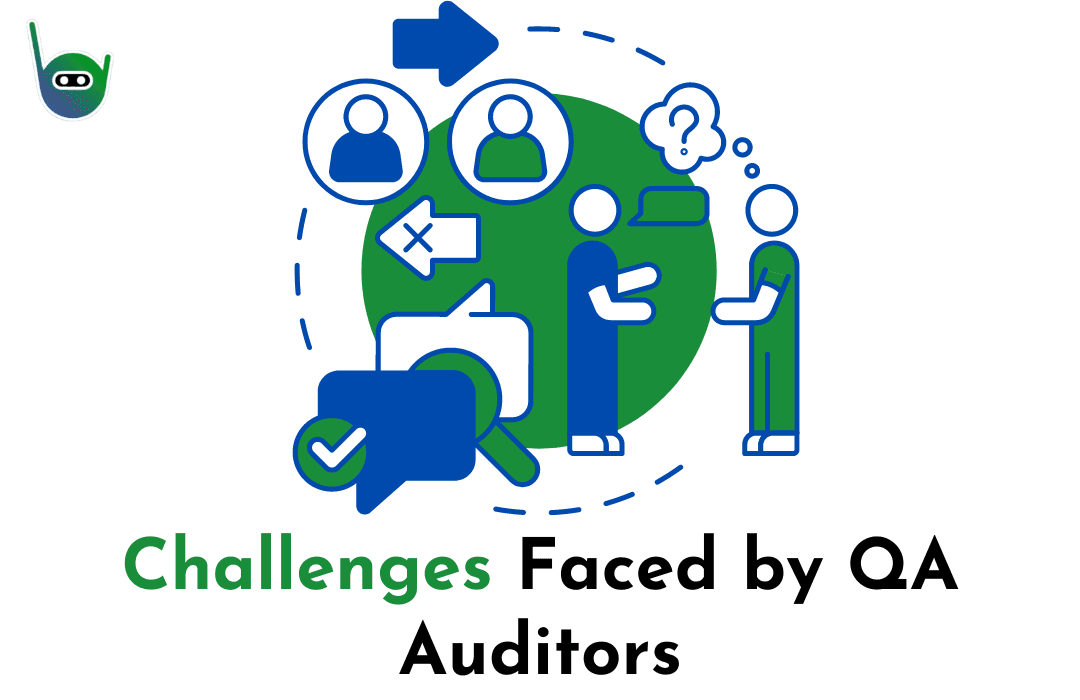
QA auditors encounter various challenges in their work. One of the primary challenges is managing the complexity of modern business operations and technological advancements. The rapid pace of innovation requires QA auditors to continuously update their skills and knowledge. Additionally, navigating organizational hierarchies and resistance to change can pose obstacles to implementing audit recommendations effectively.
Overcoming QA Audit Challenges
To overcome challenges, QA auditors should actively engage with stakeholders and foster a culture of quality within the organization. They should emphasize the importance of QA and promote collaboration across departments. Keeping up with industry trends and advancements through continuous learning and professional development is also essential. By addressing these challenges head-on, QA auditors can drive meaningful improvements in quality assurance.
Best Practices for QA Auditing
To ensure effective QA auditing, professionals should follow these best practices:
-
Define clear objectives and scope for each audit.
-
Stay updated with industry regulations and standards.
-
Utilize a risk-based approach to prioritize audits.
-
Employ a mix of manual and automated auditing techniques.
-
Maintain accurate and detailed documentation of audit findings.
-
Communicate audit results and recommendations effectively.
-
Continuously monitor and evaluate the effectiveness of corrective actions.
-
Encourage a culture of quality and continuous improvement.
QA Auditor Certification and Training
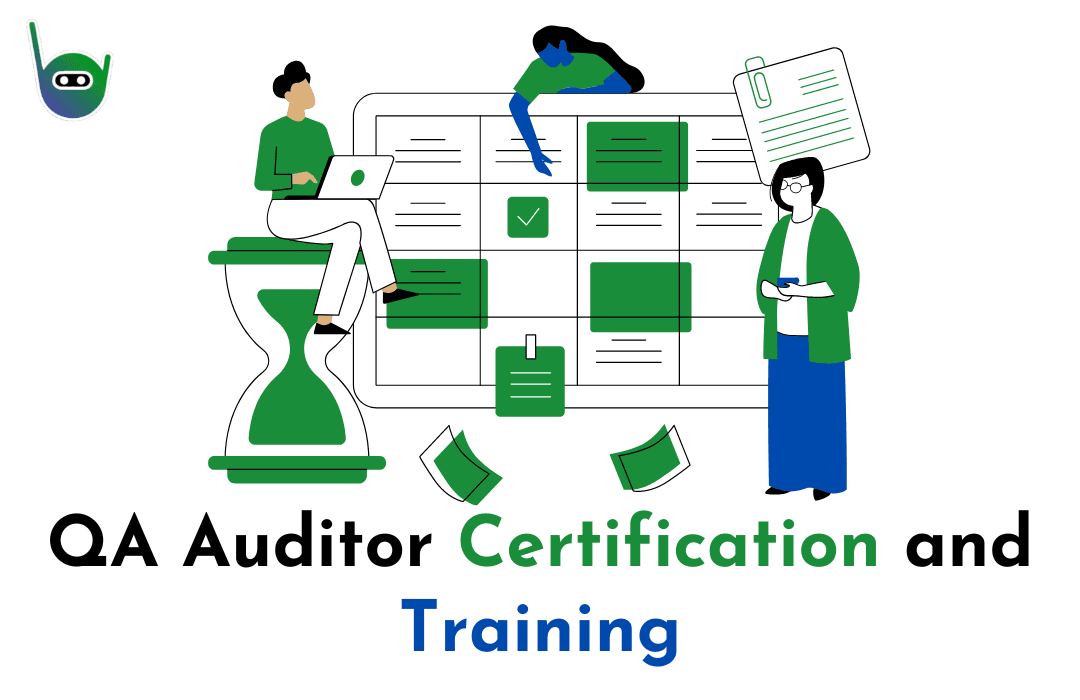
To excel in the field of QA auditing, professionals can pursue certification programs and specialized training. Certifications such as Certified Quality Auditor (CQA) or ISO 9001 Lead Auditor demonstrate proficiency and validate expertise in auditing and quality management. Training programs provide in-depth knowledge of auditing techniques, regulatory compliance, and industry-specific requirements.
Future Trends in QA Auditing
The future of QA auditing is poised for significant advancements. With the emergence of artificial intelligence, machine learning, and data analytics, QA auditors will leverage these technologies to enhance their capabilities. Automation will play a more prominent role in auditing processes, enabling real-time monitoring, predictive analysis, and continuous quality improvement. Furthermore, the integration of quality management systems with emerging technologies will streamline QA practices and drive innovation.
Revolutionize your software testing with Robonito, the ultimate no-code RPA automation testing tool. Say goodbye to endless testing hours – Robonito slashes testing time by a staggering 98%! Ready to experience the future of software testing? BOOK A FREE DEMO NOW and transform your testing process today!
Conclusion
In the ever-evolving business landscape, the role of a QA auditor is indispensable for maintaining quality standards and ensuring business success. QA auditors contribute to streamlining QA processes by conducting comprehensive audits, implementing effective strategies, utilizing automation tools, and fostering collaboration. By addressing challenges and following best practices, QA auditors play a vital role in enhancing product/service quality, regulatory compliance, and customer satisfaction.
FAQs
1. How can a QA auditor benefit my organization?
A QA auditor provides an independent evaluation of quality management processes, ensures compliance with regulations, and enhances overall product/service quality.
2. What challenges do QA auditors face in their work?
QA auditors face challenges such as managing complexity, organizational resistance to change, and keeping up with technological advancements.
3. How can QA auditors overcome these challenges?
QA auditors can overcome challenges by fostering collaboration, emphasizing the importance of QA, and continuously updating their skills and knowledge.
4. What are the best practices for QA auditing?
Best practices for QA auditing include setting clear objectives, staying updated with industry standards, utilizing a risk-based approach, and maintaining effective communication.
5. What are the future trends in QA auditing?
The future of QA auditing involves advancements in automation, artificial intelligence, machine learning, and integration with emerging technologies for real-time monitoring and predictive analysis.
-
How does QA auditing contribute to continuous improvement within an organization? QA auditing drives continuous improvement by identifying areas for enhancement, analyzing processes, and implementing corrective actions to optimize quality management systems.
-
What role does risk management play in QA auditing? Risk management is crucial in QA auditing as it helps prioritize audits, allocate resources effectively, and focus on areas with the highest impact on product/service quality and compliance.
-
How can QA auditors ensure objectivity and impartiality in their assessments? QA auditors maintain objectivity by following established standards, maintaining independence from the processes they audit, and utilizing unbiased evaluation criteria.
-
In what ways can technology aid QA auditors in their tasks? Technology assists QA auditors by automating repetitive tasks, facilitating data analysis, enabling remote auditing capabilities, and offering tools for comprehensive documentation and reporting.
-
What strategies can organizations implement to integrate QA auditing seamlessly into their operations? Organizations can integrate QA auditing by establishing a culture of quality, providing adequate resources for audits, fostering open communication channels, and embedding audit findings into decision-making processes.
-
How does QA auditing contribute to regulatory compliance? QA auditing ensures that an organization adheres to regulatory requirements by regularly assessing processes, identifying non-compliance issues, and implementing corrective measures to meet regulatory standards.
-
What are the key skills and qualities necessary for a successful QA auditor? Key skills for a QA auditor include attention to detail, analytical thinking, communication abilities, understanding of regulations, adaptability to change, and a strong grasp of quality management principles.
-
Can QA auditing be conducted in industries beyond manufacturing and service sectors? Yes, QA auditing principles are adaptable and applicable across various industries, including healthcare, finance, education, and information technology, among others, to ensure quality and compliance.
-
How does QA auditing align with sustainability and environmental responsibility? QA auditing can support sustainability efforts by evaluating processes to reduce waste, improve resource efficiency, and ensure compliance with environmental regulations and standards.
-
What measures can be taken to ensure that QA audit findings result in actionable improvements? To ensure actionable improvements, QA auditors collaborate with relevant stakeholders, prioritize findings based on impact, set clear improvement goals, and monitor the implementation of corrective actions.

